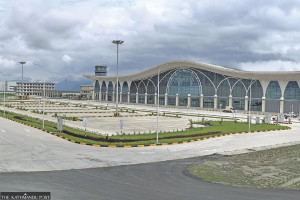Miscellaneous
Indian MPs criticise New Delhi’s Nepal policy
Indian lawmakers, especially those from the opposition parties, on Monday criticised the Indian government’s handling of Nepal affairs in the run-up to constitution promulgation.
Indian lawmakers, especially those from the opposition parties, on Monday criticised the Indian government’s handling of Nepal affairs in the run-up to constitution promulgation.
Calling the Indian government to play a constructive role of a good mediator, Janata Dal United lawmaker Pawan Kumar Verma criticised New Delhi for acting late when the constitution was already adopted.
Questioning the Indian foreign secretary’s visit two days ahead of constitution promulgation in Nepal, Verma said, “Knowing the criticality of the exercise, was this the only investment required of a diplomatic establishment and political leadership? What were we doing between June-August 2015? In terms of sustained persuasion, diplomacy, what were we doing?”
Speaking in Rajya Sabha, Verma said India should not act as a big brother. He charged the Narendra Modi government with lacking a coherent policy for handling the Nepal crisis.
“There are reports even within the foreign policy establishments that there were differences of opinion which in a sense prevented the emergence of a coherent strategic policy on Nepal between, for instance, our embassy and the foreign ministry,” he added.
Hinting at the role of the Rashtriya Swayamsevak Sangh in Nepal affairs, Verma said there were parallel establishments dealing with Nepal. “People say particular individuals of that organisation are as powerful as the ministry of external affairs.”
Verma was also critical of the Modi government internationalising the Nepal issue by criticising the country at the UN Human Rights Council and including a critical reference to Nepal and the Maldives in a joint statement with the UK prime minister. “It’s a bilateral relation. It was always been. We do not need third-party mediation in our relations with Nepal. Was there a sense of adhocism in this?” asked Verma.
Congress I senior leader Karan Singh remarked that it was a mistake and undiplomatic move on the Indian government’s part to send a special envoy to Nepal to stop the formal adoption of the new constitution at the eleventh hour.
He, however, said the rights granted by Nepal’s new constitution to the agitating Madhesi group were fewer compared to what the Interim Constitution had provisioned. He added that the constitution had demarcated the federal states so as to weaken the demand for ‘one Madhes one province’. The onset of winter has already created a humanitarian crisis in Nepal, which is recovering from the destruction caused by the devastating earthquake, said Singh.
“There is a humanitarian crisis in Nepal due to a lack of essentials like medicines and other stuff. The Indian government can send medicines by Army planes,” he said. The Congress I leader noted that the praise that Indian PM Modi received during his first visit to Nepal had gone down the drain. “Almost every newspaper published from Kathmandu is filled with anti-India news,” he said.
Janata Dal (United) Chairman Sharad Yadav said the current standoff in Nepal between the government and the Madhesi parties is the neighbour’s internal affairs and India should play a constructive role of mediator to seek a solution to the deepening crisis. He warned that it would be a grave mistake if any party or leader tried to take advantage of the humanitarian crisis in Nepal.
Samajwadi Party lawmaker from Uttar Pradesh, Ravi Prakash Verma urged the government to make its position clear on the straining age-old ties with Nepal and the initiatives taken to resolve the crisis. He added that the Indian government should respect Nepal’s sovereignty.
“Does it mean that we have an ulterior motive behind our apparent good gestures?” Verma wondered. He warned the government to take steps before the ongoing Madhes movement goes into the hands of radicals.
Salim Ansari, Bahujan Samaj Party MP from Uttar Pradesh, said, “Nepal is our brother and we should not lose our brother.” The Indian government should reach out to both sides of the conflict in Nepal—the ruling and the agitating Madhesi parties—and play the role of a mediator to end the crisis. “This is the first time in 65 years after independence that our relationship with Nepal faces serious risks,” he added.




 8.12°C Kathmandu
8.12°C Kathmandu









